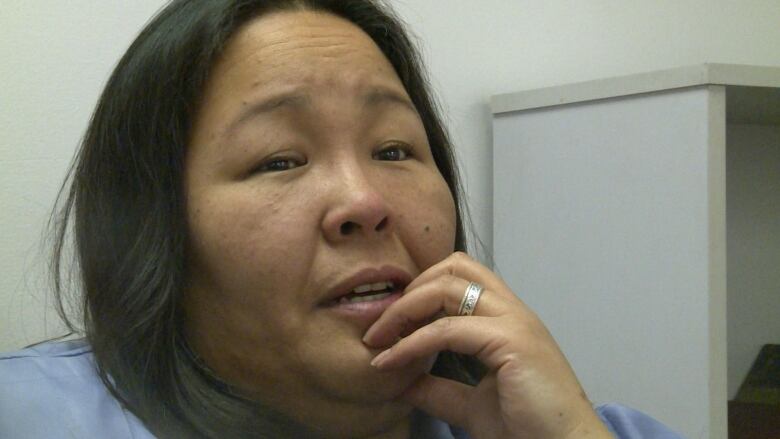Sixties Scoop still not well-recognized, aboriginal adoptees say
Experts say exact numbers of aboriginal children adopted by Quebec families unclear

Real Talk on Raceis CBC Montreal's special series exploring personal conversations and experiences around race in the city.
For decades, thousands of aboriginal children were taken from their parents, often without their consent or even their knowledge, and grew up never knowing theirown culture.
But a lot of Canadians don't knowit.
- Nakuset's Point of View: 'Change her name. Don't tell her she'snative'
- Share your thoughts on this story on the CBC MontrealFacebookpage
"My parents who adopted me had no idea I was stolen," said Nina Segalowitz, a child of what's known as the Sixties Scoop."They had no idea the scope of how many kids...had been stolen and were in the system."
Segalowitz grew up in Montreal, the daughter of a white Jewish father and a Filipino mother. But she was born Anne-Marie Thrasher, in Fort Smith, Northwest Territories.
My parents who adopted me had no idea I was stolen.- NinaSegalowitz, aboriginal child of SixtiesScoop
Shewas taken from her birth parentswhen they brought her to the hospital for treatment as an infant. Her parents, who had both attended residential schools, were asked to fill out admission forms, even though, according to Segalowitz, theywere not very literate.
"They said, 'Come back tomorrow morning. We'll have medication for your baby,'" said Segalowitz.
"My mother came back the next day and I was gone."
'They were literally scooping children from their homes'
The term Sixties Scoop was coined by a B.C. social worker, Bridget Moran, who was concerned about how child welfare services were dealing with aboriginal children.
"She told a colleague that they were literally scooping children from their homes without any valid reasons," saidRavenSinclair, associate professor of social work at the University of Regina in Saskatoon, and herself a Sixties Scoop adoptee.
Sinclairsaid the phenomenon began asresidential schools started to shut down. At the same time, provinces begantaking over child welfare responsibility from the federal government.
Between the1950sand the end of the1960s, she saidthe percentage of children in care who were aboriginal skyrocketed from less than onepercentto roughly 40 per cent.
Segalowitzand some of her fellow adoptees from western and northern Canadawere placed with families through the former Jewish Family Services in Montreal.
Segalowitzsaid she encounters lots of people who don't know anything about the Sixties Scoop when she givestalks about her experience at high schools and universities.
"There's a lot of people who are enraged by the fact that the government hid this from the Canadian population...the number of families that had been broken up and devastated by this," she said.
Numbers unclear
It's not clear exactly how many children had the same experience asSegalowitz. Between the1960sand 1985, the federal government estimates that just over 11,000 children were removed from their families and adopted out.
But the real number may be anywhere from20,000 and 50,000 children, according to RavenSinclair, associate professor of social work at the University of Regina in Saskatoon.
"Child welfare practices sometimes labelled children as non-status orMtis," saidSinclair, herself a Sixties Scoop adoptee."And we believe that was inorder to make them seem more adoptable."
The number of children removed province by province is also unclear.
'You were taken from us'
Many adoptees grew up never knowing that their parents hadn't consented to give them up.
Lionel Kalisky was adopted into a Montreal-area family, after he was removed from his parents of Dog Creek, Lake Manitoba First Nation.
When he met his birth parents as a young man, he was angry and asked, "Why did you get rid of me?"
"I wasn'tready for the answer that came. I wasn't ready for them to say, 'You were taken from us.'"
"I thought that [my mother] was just being defensive and telling me stories or whatever. But now that I've become aware of the scope of the situation, the Sixties Scoop, and how many people were affected by it.I see it."
Seeking compensation
The provinceof Manitoba has issued an official apology for the Sixties Scoop. Class-action lawsuits have been launched on behalf of adoptees in Alberta, Saskatchewan,Manitoba and Ontario,seeking compensation for loss of language and culture.
- Discover more stories in our Real Talk on Race series
- Share your thoughts on this story on our Facebook page
Sinclair said she would like to see all adoptees given proper access to counselling and psychological services.
"Ask yourself, what would you think would be appropriate reparation if you had been taken away from your family as an infant or a toddler and didn't see them until you were in your 20s," she said. "What is that worth?"
















_(720p).jpg)


 OFFICIAL HD MUSIC VIDEO.jpg)
.jpg)



























































































